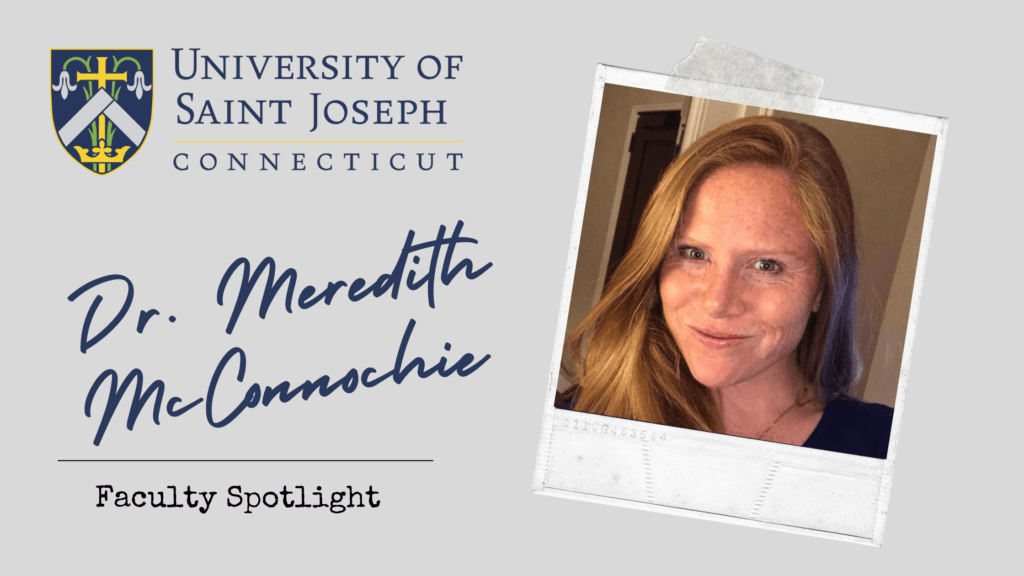Come meet Dr. Meredith McConnochie, USJ’s passionate Assistant Professor of Education and Director of graduate Early Childhood-Special Education Program.
What programs do you teach at University of Saint Joseph? What drew you to this field of study? What keeps you excited about it?
I primarily teach courses for the Early Childhood-Special Education program and the Teaching English to Speakers of Other Languages (TESOL) program. However, I also frequently teach courses that prepare all initial teacher certification candidates to support multilingual learners in their classrooms and effectively read and write articles that will help them improve their teaching practice and advocate for equitable education policies.
I first became interested in early language learning as an undergraduate student. As a psychology major, I began observing and assisting in a laboratory school at Carnegie Mellon University. These experiences triggered my curiosity about how children learn to use and understand language at the beginning stages of development. While simultaneously taking courses offered by the Spanish department, I learned about the cognitive and social benefits of dual language programs for children from immigrant families. I became inspired to pursue a career as a multilingual educator.
I continue to get excited to teach our University of Saint Joseph (USJ) students about the important role they will play in creating inclusive school and classroom environments that engage our multilingual students in learning.
How will your program better prepare/equip educators for the current climate they are facing?
While it has been challenging for all to learn and teach during the pandemic, whether in-person with masks or virtually over a computer screen, it has been especially difficult for young children and families who are still acquiring English and trying to navigate the U.S. education system.
During and post-COVID, it will be particularly important for all teachers to have a more expansive repertoire of ideas for creating opportunities to allow students to develop listening, speaking, reading, and writing abilities in one or multiple languages. Opportunities and exposure to practicing languages for social and academic purposes are crucial for development yet can be limited when students or families struggle to connect over the computer screen.
Our faculty thrives in making space for our students to express concerns and discuss the pressing issues facing teachers in schools. One of the benefits of participating in our programs is getting support from faculty and peers in finding creative solutions for solving them.
One of the most rewarding things for me has been witnessing how new and veteran teachers excel in finding ways to counteract policies and practices that marginalize students based on racial, linguistic, or cultural background, and designing action research projects aimed at creating more inclusive schooling environments.
What attracted you to teach at University of Saint Joseph? What sets them apart?
I was particularly excited to teach at the University of Saint Joseph because of the opportunity to collaborate with other faculty in the department of education. It was evident from my earliest interactions that my colleagues were equally passionate about social justice and committed to creating a supportive environment for teacher growth.
I think what sets USJ apart is a faculty dedicated to continually improving our various programs through conversations with one another and our students about our expertise and experiences. What makes any teaching rewarding and effective is the relationships you can develop with students.
I believe that USJ excels in developing these positive relationships because of a small size that allows for plenty of interaction between students and faculty and the depth of knowledge, warmth, and passion exuded by faculty and staff.
What is your professional background as an educator?
As mentioned earlier, I began to carve my professional pathway at Carnegie Mellon University where I learned about child development and second language acquisition processes. In 2004, I completed a B.S. in Psychology with a minor in Spanish.
After graduation, I worked for a year at The Children’s Center of Pittsburgh as a co-teacher in a classroom of two- to three-year-old children. Increasingly fascinated by the emerging bilingual children I observed in my class, I decided to pursue a masters’ degree in multilingual education and completed an M.A. in Bilingual/Bicultural Education at Teachers College at Columbia University in 2007.
While simultaneously completing the NY State requirements for elementary education with bilingual certification in Spanish-English, I had opportunities to student teach in a second-grade classroom in Manhattan and a fifth-grade dual language classroom in Washington Heights.
I then worked for a year as a kindergarten teacher for a dual language program before continuing my teaching career abroad. Seeking more opportunities to develop my Spanish fluency, I moved to Barcelona, Spain, and worked for a year as a first-grade co-teacher at Benjamin Franklin International School. Soon after returning to the U.S., I transitioned into a state role of parent involvement specialist for the non-profit organization, Prevent Child Abuse New Jersey. I worked with early childhood centers and elementary schools across the state, mainly in Spanish-speaking communities, to develop their family engagement programs.
Interested in learning more about improving family-school relations in immigrant communities, I applied to Rutgers University in New Jersey and completed a Ph.D. in Language Education.
Tell us a little about yourself. Why did you become interested in education?
My interest in language education was largely shaped by various cross-cultural experiences I was fortunate to have as a child and young adult. As a child, I had the opportunity to learn about different languages and countries when my parents sponsored exchange students, one from Mexico and one from Russia. During college, I also had an opportunity to live and study for a couple of months in Madrid, Spain, and then, immediately after college, to live for a couple of months in Chile with the friends and family of my Chilean sister-in-law.
In the small coastal town of Tome, Chile, I volunteered for several months in the local elementary school, where I observed and helped teachers with English instruction. These experiences were formative in broadening my perspectives about living, thinking, learning, and communicating, and fomented a desire to expand opportunities for cross-cultural and multilingual learning for other children and adults.
What would you tell prospective students considering your program about yourself? What’s something that students and colleagues should know about you?
One thing I think students will notice in my courses is that I am particularly passionate about preparing students to collect and interpret qualitative research data about students, families, and their classroom interactions to improve their teaching practice. I get particularly excited to teach students how to apply research, theories, and methods of sociolinguistics and anthropology, and use them to analyze and reflect on their teacher practice within the community and school contexts in which they work.
Drawing from sociolinguistics and applied linguistics insights, I prepare teachers to critically analyze how they can facilitate more inclusive interactions for students who speak diverse languages and dialects at home. I also engage students in ethnographic methods to learn more about the communities in which they work and develop stronger relationships with students and families.
What advice do you have for students interested in pursuing their Early Childhood-Special Education or TESOL degrees? How can people stand out in these fields?
I think what makes any students or teachers stand out in education is their understanding that there is always more to learn from research, our colleagues, students, and families. The most challenging and interesting part of teaching is the need to constantly learn and adapt to new situations because students and families have unique strengths and needs; the societal and community contexts in which we teach are always evolving.
The best teachers are those that seek to learn about their students, families, and communities, persist in trying new ways to motivate and engage students in education based on what students have already learned, and collaborate with colleagues to advocate for changes to inequitable educational policies and practices.


